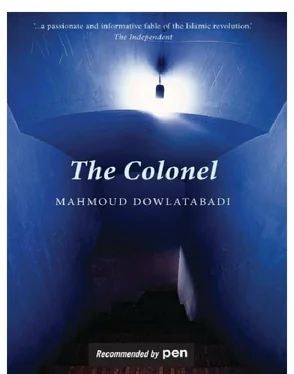“You need someone who’s next of kin, Colonel; the body has to be washed by someone next of kin, like a mother or a sister.”
Ali Seif ’s voice hit the colonel like a slap in the face and hung there for a moment until the echo died away. Of course, he knew perfectly well that the laying out had to be done by a close relative, but it vexed him that nobody had thought about it earlier. What could be done about it now that the ambulance had gone back? Why had they not told him before? How could nobody have thought about a body washer when they had sat him down in the ambulance, with no idea where he was going, next to his dead daughter? Isn’t body washing the most basic part of their job? What are they bloody paid for? They shouldn’t break things to people so suddenly and with such bad timing, when they should have thought about it beforehand. But it’s no good worrying about that now; I need to get on with it.
“Yes, colonel, you need to sort this out. We’ll stay here until you get back. Go and fetch her sister. Have a think, and bring whatever else you need. But we haven’t got all night, you know.”
“Yes, I know.” I know that we have to get this thing over with by daylight. “But where can I get a gravedigger from? Some out-of-work fellow off the street, maybe?”
“No.”
“Oh, are there graves ready dug, then?”
“That’s a thought, but no. We’ll help you dig. But we need a pick and shovel. Where are we going to get them from?”
“I wish you’d thought about that before the ambulance went off. I wish I had had my wits about me at the time, but then my wits aren’t what they used to be…”
The colonel’s problem with his wits was that he had got used to living in the past and thinking about nothing else. The past had such a hold on him that he had grown afraid of dealing with what was happening under his nose. This fear of the present and living in the past had become a habit. Perhaps it was just an instinctive retreat, a defence against events.
In occasional idle moments, his thoughts wandered back to the story of Rostam and Ashkabus, those ancient enemies of the Shahnameh, and he would lose himself in the story of their battle, which he never tired of… Really, he ought to have given his children names like Paridokht and Ashkabus. 14He was fully aware of this involuntary tendency of his to dwell on the past, and it bothered him that even now it might make him forget what it was that he had to fetch. And so, as he walked back home, he kept repeating aloud to himself, ‘pick and shovel; Farzaneh, shroud, pick and shovel; Farzaneh, shroud…’
“Right, gentlemen… I’ll leave you in charge of my daughter until I get back.”
The colonel left the mortuary without bothering to wait for an answer. He knew perfectly well that there could be no answer to what he had just said and, when he thought about it, he realised that there was no need to have said it. But then, is anything we say ever really necessary, and are all words to be weighed in the balance of reason? No, most things we say are to stop ourselves worrying and to keep a lid on our own fears, so that, in time, they become just a habit. It’s like when, without thinking, we tell one of our boys — let’s say my Kuchik — who is heading off to war, to take care. Well, really, as if he wouldn’t take care if we didn’t say it! In effect, aren’t we just trying to say that the war should look after him? No, since the war has not undertaken to take care of anyone. So, even though we know that what we say means nothing, we still say it, just out of a wish to stop our loved ones from worrying. Otherwise, could there be anything more moronic than a man of the colonel’s age asking two young warriors to look after his daughter, a girl who was asleep for all eternity in her coffin? After all, they had not looked after her very well when she’d been alive, had they?
It’s stupid, just stupid; either everything is stupid, or I am an idiot!
When young Masoud had been about to set off for the front, the colonel, without thinking, had said to him, “Take care of yourself, my boy.” The instant he said it, he was all too conscious of the fact that war was some kind of poisonous, carnivorous plant. You could make it responsible for anything, except for the lives of the people caught up in it. Apart from anything else, anyone could tell that, if war was going to be answerable for people’s welfare, then war would not be war. It would be something else. What else could I have said? Any fool can see that if someone’s worried about his own welfare, he is hardly going to go to war! So, if he had really wanted to dissuade little Masoud, he should have said something quite different to him before he had set off, and come up with some far more persuasive arguments.
But I was firmly of the view that my children, each in their own way and independently of me, had the right to form their own set of values and standards, even though Masoud had persuaded himself that his entire family was beyond the pale, including me, his own father. Sure, I believed in independence for my children, but it’s a bit late to do anything about it now, even if I wanted to, isn’t it?
Am I going the right way? It looks right.
Yes, he could see the city lights in front of him. It was lucky that the city was out of range of Iraqi missiles, otherwise there would have been blackouts and the colonel would not have been able to find his way. By now, though, he was sure he was on the right track, heading towards the entrance to the narrow street which, after several twists and turns past a number of cul-de-sacs, eventually emerged into the square in front of the town hall and carried on to the little alley where his house was. He did not have to go through the square, though. Another way was to climb a grassy slope, taking care not to slip on the wet, rotting grass and then go down to a big hollow, which was not very deep but was always full of mud and rainwater, where he had to watch his step. After going round the hollow, he reached his alleyway, a little alleyway that was just made for a fine spring day when a man could take his stick and go out for a walk. For no sooner had you emerged from it than you could see in front of you the meadows on the foothills ablaze with flowers, and inhale the breeze that came down the mountains to fill the lungs, blowing away the accumulation of cheap cigarette smoke, and sucking in the delight of being alive. These were moments to be savoured, when no black clouds hung over the sky, and the sun did not seem to have swallowed itself in grief. Not like these days, when the sun seemed to have been buried for ever and there was nothing but the irritating drip of incessant, soul-destroying rain.
As the colonel turned into his street he knew that he had to be careful how he went at this late hour, and have some answers ready for the young men who hung around on every street corner like goats, seeing conspiracies and plots in the most everyday comings and goings. It was as if they were training to be detectives, practising on the passers-by. To lend weight to their dangerous game, they had to imagine that each of the passers-by had committed some criminal act. At the very least, they were involved in adultery or drug smuggling, or visiting a cache of weapons, or were linked to people who were plotting to overthrow the regime. Perhaps the colonel was getting carried away, but the fact was that he had no wish to make his problems any worse and, if he was letting his imagination get the better of him, he chose to see it as some passing compulsion that was not natural to him. It grew out of the atmosphere that pervaded the streets and alleyways where he lived. He regarded the fear and insecurity that this atmosphere provoked in him as a kind of necessary training for life which, like it or not, everyone was forced to be inoculated with. Take the sensation of fear, for instance. You can be frightened of something without knowing what it is. Looming over your head, you fancy you see a sword held in an invisible hand, and you have long felt its steel in your bowels. This feeling is irrational, and you cannot shake it off. Because you fear being spied upon, you end up believing that you really are being spied upon. But if this turns out not to be so, you still have to ask yourself why you can’t stop imagining that it’s happening. Where does this corrosive and exhausting feeling that constantly tells you that every eye is watching you come from?
Читать дальше












